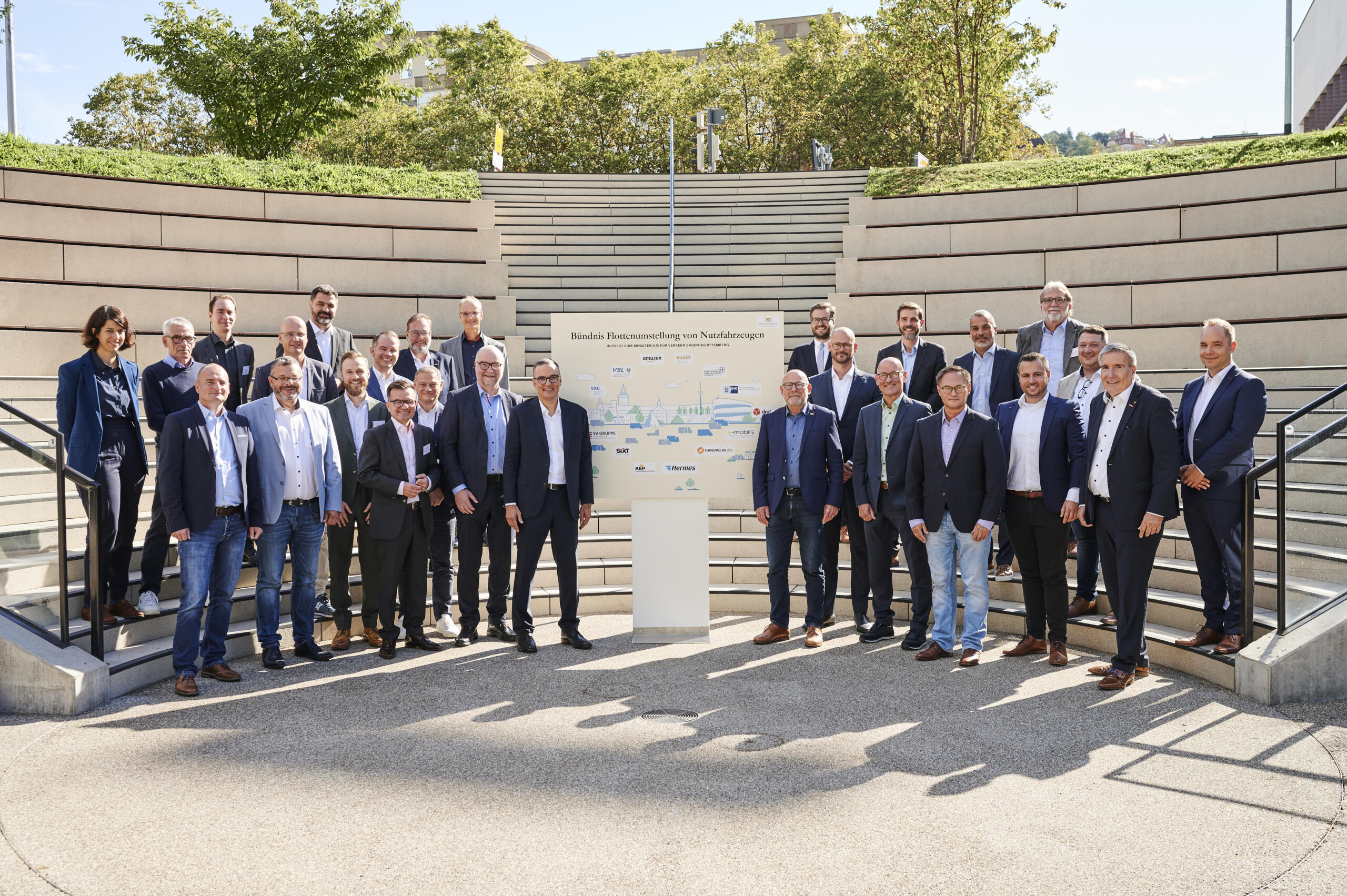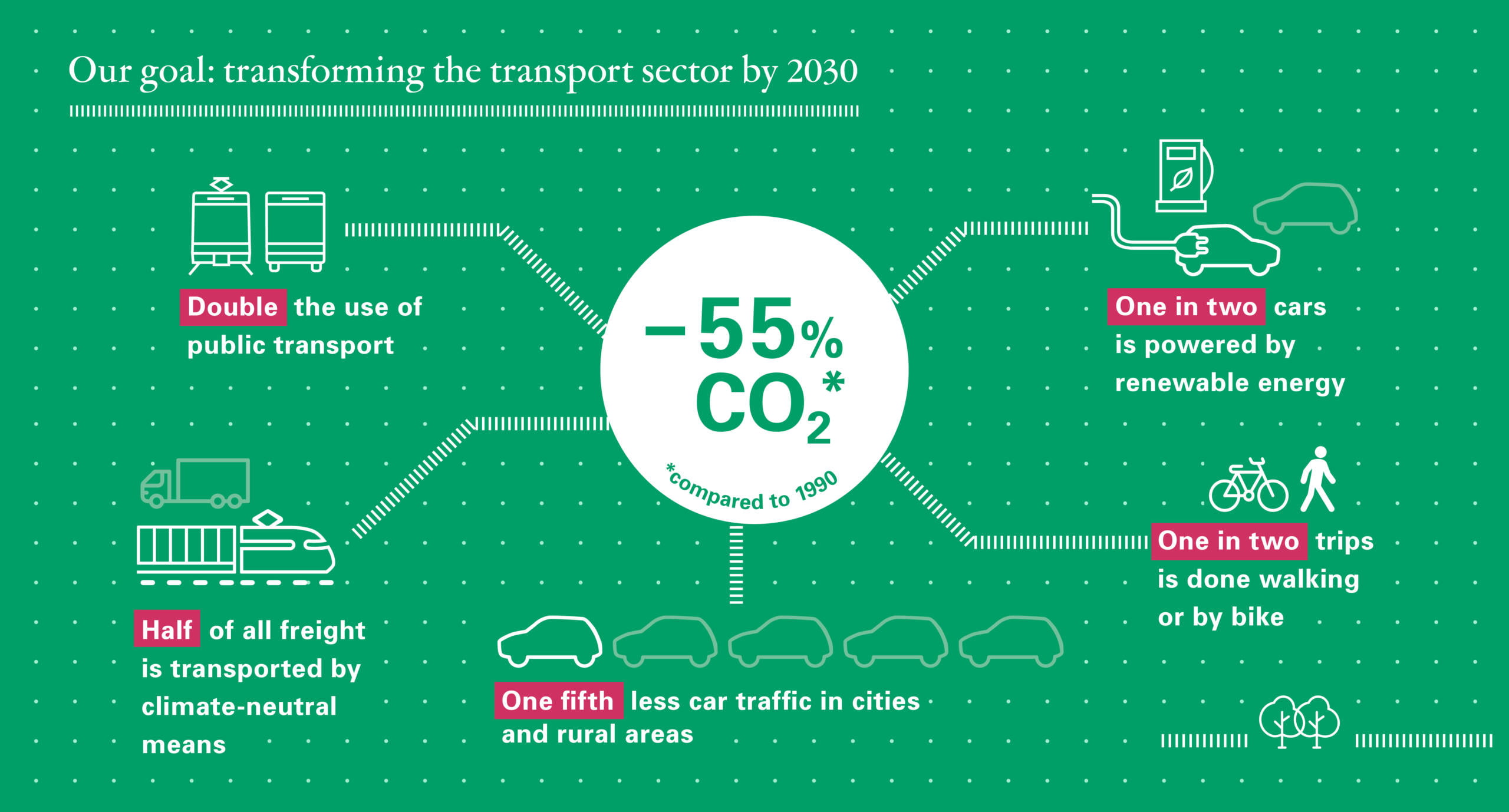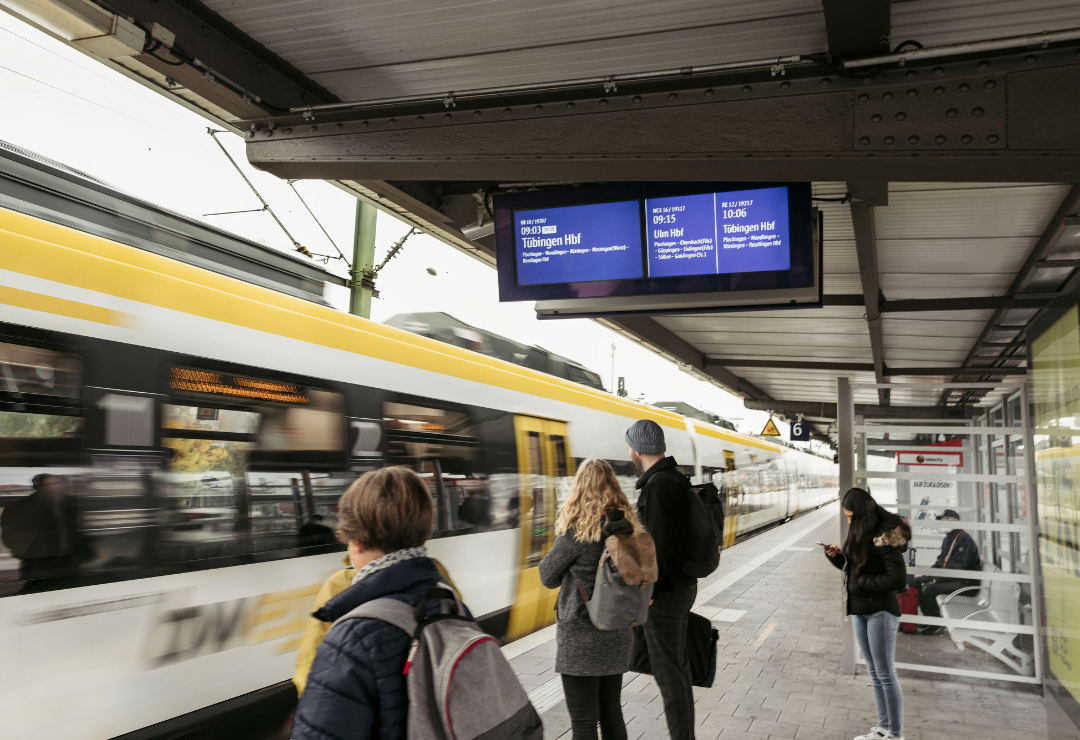All Hands on Deck
Cooperation between local authorities and the private sector will be essential for achieving climate neutrality targets. Baden-Württemberg reveals how they are encouraging employers and commercial vehicle operators to take bolder steps towards sustainable mobility.
To listen to the recording of the article below, please accept all cookies.
Baden-Württemberg is committed to achieving a 55% reduction in emissions from the transport sector by 2030, in comparison to 1990 levels, ultimately aiming for climate neutrality by 2040. Although these targets are ambitious, particularly given that the mobility sector accounts for approximately one-third of the region's total emissions, Baden-Württemberg is tackling this challenge with enthusiasm. The region's approach to meeting these goals offers valuable lessons for others endeavouring to pursue similar objectives.
The Mobility and Climate Concept
Based on scientific modelling and a range of studies, the Ministry of Transport of Baden-Württemberg has specified several key targets for the mobility sector, including an increase in renewably powered vehicles for passenger and freight, as well as a doubling in public transport usage, a rise in active travel, and major cuts in car traffic.
Each of these goals cannot be achieved without the other, and require collaboration between local, state, federal, and EU levels, and the specific avenues for cooperation are currently being set out in the Mobility and Climate Concept of the State of Baden-Württemberg. The Concept defines clearly how states and municipalities share financial and political responsibilities for implementing each of the nearly 30 climate protection measures and must work together to define milestones as well as indicators to keep track of implementation progress and mobility effects.
The Mobility and Climate Concept in addition aims to assure mobility for all, regardless of income, disabilities, age, socio-economic background or gender, through the design of suitable measures. It looks at compliance with the different mobility requirements in urban and rural areas and systematically reflects an economically efficient use of public and private funds. The state also supports municipalities by offering a climate bonus to particularly climate-friendly infrastructure projects that are part of ambitious climate mobility plans.
However, governments cannot solve all transformation challenges. Cooperation with the private sector is equally critical for reaching these targets, working with organisations to shift commuting habits, encouraging greener business travel, and revisiting their corporate fleet policies. Indeed, the Ministry of Transport launched two specific alliances with companies, employees and their associations.
Sustainable mobility at work
One-third of all traffic in the region is related to commuting and business travel, with an overwhelming volume of this from private car travel.
Therefore, implementing sustainable mobility in working environments requires support from companies, employees, and associations. From the employer side, each company is being asked to more concertedly pursue and implement conditions for electric cars, bikes, and public transport. They can do so by, for instance, advocating to the municipalities and transport operators for adequate infrastructure and services.

Launch event of the alliance “Climate-neutral commercial vehicles.” Credit: Baden-Württemberg
In July 2023, companies, associations, and the Ministry of Transport signed an agreement for sustainable mobility at work. It sets clear common targets to have visible outcomes in 2027, chasing climate-neutral commuting and business trips. Core measures include:
- Preparations for charging infrastructures to purchase solely climate-neutral cars in 2027;
- Seek to implement a mobility budget instead of providing company cars for private usage;
- Initiate mobility surveys and housing analysis as well as dialogues with employees and their representatives, municipalities and transport operators to make buses and trains much more attractive;
- Provide each company location with adequate high-quality bike parking facilities and improve other conditions for biking as well as walking.
Moreover, the agreement lists individual contributions by companies such as Robert Bosch, SAP, Roche Diagnostics, Schwarz Mobility Solutions, Vetter Pharma-Fertigung, and two large clinics, as well as several company representations and trade unions, mobility associations and transport operators, each of them with specific measures. A follow-up process is also designed to foster exchange about the identified core activities and to motivate additional companies to join.
Climate-neutral commercial vehicles
Freight transport on roads accounts for one-third of the traffic-based carbon emissions in Baden-Württemberg. New climate-neural light and medium-duty commercial vehicles are a high investment for companies that own, operate, or order such fleets. Therefore, businesses require a reliable planning perspective, to implement and operate infrastructure and vehicles.
Companies and their associations expect — and need — the local, regional and federal governments to act towards reliable electric infrastructure and fast planning processes, with coordination between municipal departments. Moreover, they are interested in a visible presence in discussions with vehicle manufacturers. In particular, the federal government also request bold action through funding schemes to cover part of additional costs for climate-neutral vehicles, and Baden-Württemberg intends to provide supplement funding for such extra efforts that are not covered yet.

Targets for the transformation of the transport sector in Baden-Württemberg. Credit: Baden-Württemberg
In September 2023, a cooperation agreement between Baden-Württemberg and purchasers of commercial vehicles was signed, which stipulates that 50% of all light and medium-duty commercial vehicles up to 12 tons will be operated with clean fuels by 2030. The associated partners, initially supported by governmental funding, promise to take the necessary steps themselves. They moreover act as advocates and supporters for this target and the relevant actions within their ecosystems, e.g. towards their members in the case of the associations.
The alliance focuses on regional transport. Here, as a region, Baden-Württemberg is in an apt position to help companies make practical changes in implementing electric infrastructure in and around offices and industrial areas. Since 2017, Baden-Württemberg’s government has coordinated a dialogue with the private sector, society, and academia on the transformation of the automotive industry, which has provided a springboard for closer collaboration with vehicle manufacturers, electricity networks and charging infrastructure suppliers.
In the agreement, some companies including Amazon, DPD, Hermes, Sixt, and a regional newspaper distributer (SV-Group) have set even more ambitious individual targets for the speed of transforming their fleets towards climate-neutral commercial vehicles.
Companies and their associations support the Ministry of Transport in these two new alliances and thus are accelerating the shift to more sustainable passenger and commercial vehicles — above and beyond EU regulation. The associations help the region to understand and address the pinch points for the shift to cleaner vehicles and infrastructure requirements. However, critical challenges remain, and improvements in energy grids, land-use options, connected charging infrastructure, and more, demand inputs from national and international actors. The collaboration must continue!
Click here to read the article in its original format.
About the authors:
Wolf Engelbach is the Head of Unit for the Ministry of Transport of Baden-Württemberg. He studied spatial planning and managed European and national research projects for about 20 years. Since 2017 he has worked at the Ministry of Transport, initially on digitalisation and climate projection. He is now in charge of European affairs and the ‘Mobility and Climate Concept’ in Baden-Württemberg.
Christoph Erdmenger is the Head of Department for the Ministry of Transport of Baden-Württemberg, responsible for climate protection, traffic safety, and the reduction of noise and air pollution. He supports the uptake of electric mobility in cars and commercial vehicles and also fosters walking and biking strategies, funding, and infrastructure.
Berthold Frieß is the Director General and Permanent Representative of the Minister for the Ministry of Transport of Baden-Württemberg. He is in charge of the internal organisation and inter-ministerial cooperation at the Ministry. Until 2021 he was Director of the State Parliament of Baden-Württemberg.
Miriam Koch is a Policy Advisor for the Ministry of Transport of Baden-Württemberg. She is responsible for stakeholder management and participation processes on the ‘Mobility and Climate Concept.’ Before joining the Ministry of Transport in 2022, she worked in the representation of interests for an association in Baden-Württemberg.
Eugenia Kolb is a Policy Advisor for the Ministry of Transport of Baden-Württemberg, where is responsible for cross-border cooperation, with a focus on France. Previously, she advised municipalities on the implementation of Sustainable Urban Mobility Plans (SUMPs).
